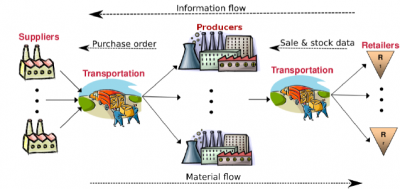
Supply chains are distributed and decentralised in nature, with multiple player operating in a dynamic and stochastic environment. Activities and decisions are becoming increasingly customer-centric, and there is a deluge of data. However, extracting meaningful information and prescribing effective real-time decision using the data is non-trivial.Our current works are as follows:
■ In the area of healthcare, we have developed an integrated system dynamics model for studying spread of infectious diseases (epidemics) and medicine supply chain together. We have proposed a real-time decision support system to dynamically forecast the medicine demand which can be used to reduce the spread of infectious diseases. A study based approach to understand the role of supply chains in practice on diseases dynamics is underway.
■ In the area of development and practice, we have planned and operationalised a massive supply chain consisting of 4 vendors, ~60 assembly and distribution centers and ~450 after-sales repair centers, spread across 4 states of India. This network is established for the Million Solar Urja Lamp (SoUL) project wherein solar study lamps were assembled by trained local people and sold to school students, at scale (1 million beneficiaries). The diffusion process, akin to any supply chain, involved uncertainties in demand, supply, activity times, and data. Interesting issues pertaining to large scale deployment of technological solutions and socio-economic development are uncovered. Based on the rich practical experience, we are working to develop newer models of diffusion by extending the classical Bass diffusion model, better planning algorithms under uncertainty and real-time, big data analytics towards better after-sales service, and basic concepts in localising manufacturing capabilities.
■ New approaches for supply chain coordination has been proposed using decomposed and decentralised decision making models based on Lagrangian relaxation and column generation methods. This is motivated by a real-world coal mining example, which is generalised to a multi- resource constrained scheduling problem.
Prof. J Venkateswaran
